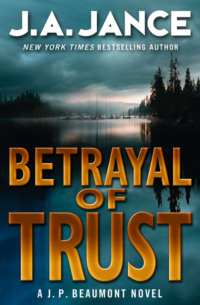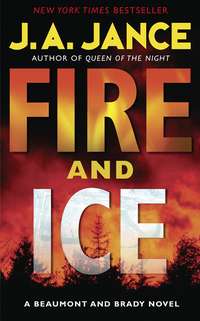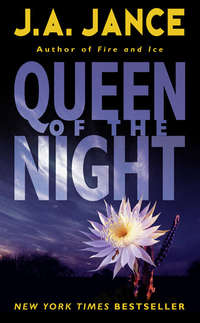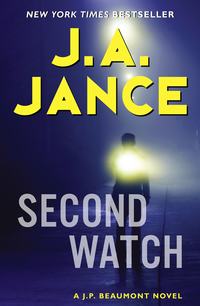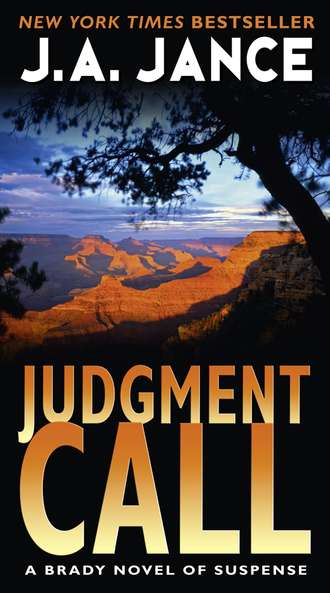
Полная версия
Judgment Call
Joanna estimated that they covered the better part of a mile between the first wash and the next. After that, when the road became even rougher, Jenny slowed Kiddo to a walk. A mile later, Jenny pulled Kiddo to a halt and nodded toward something beside the road. It resembled a fully clothed rag doll lying in an awkward heap. Only on closer inspection did the heap resolve itself into a woman’s body.
Joanna slid off the horse. While Jenny remained on a restive Kiddo, Joanna moved toward the body. She stopped short several feet away and stood still, giving herself a chance to examine both the victim and the nearby surroundings.
The body of a woman, with her head twisted to one side, lay prone in a flat expanse of rocky dirt. The victim had been there long enough for carrion eaters to have made inroads on her facial features, leaving her unrecognizable. She was dressed in the kind of clothing someone might have worn to work—a dirt- and blood-stained white blouse and tailored navy blue jacket and skirt. A name badge, still pinned to the lapel of her jacket, identified her as DEBRA HIGHSMITH. Her bare feet showed the laddered remnants of a pair of panty hose. It looked as though she had been shot in the back. Joanna counted four different entrance wounds, one in her right leg and the others in her torso. She hadn’t died instantly, but Joanna knew she couldn’t have survived for long because there wasn’t much blood. What there was had turned brown in the sun.
After ascertaining there were no visible footprints that would be disturbed by her presence, Joanna stepped closer. That sudden movement sent a black cloud of flies milling skyward. The distinctive stench of decomposition was thick in the air. Fighting down her gag reflex, Joanna didn’t need a medical examiner to tell her Debra Highsmith had been dead for some time, probably more than a day.
“There’s not a lot of blood,” Jenny observed from the sidelines. “She must have died right away.”
Joanna gave her fifteen-year-old daughter an appraising look. Joanna had tried her best to protect Jenny from some of the grim realities of growing up in a law enforcement family, but clearly she’d been paying attention. Her astute observation warranted an acknowledgment.
“You’re right,” Joanna said. “Let’s hope she didn’t suffer too much.”
“Maybe not after she got shot,” Jenny said, “but what about before?”
That one rocked Joanna, too, because once again Jenny’s conclusion was on the money. There was enough visible bruising around the victim’s wrists and ankles to show that she had been restrained for some period of time before being shot. Given that, there was no way to tell what kind of damage might have been inflicted prior to shooting.
“Yes,” Joanna agreed. “After.”
She plucked her phone out of the pocket of her uniform and punched the speed-dial combination that would take her to Dispatch. Larry Kendrick, her lead dispatcher, took the call.
“Good morning, Sheriff Brady,” he said, greeting her by name before she said a word. In the world of nearly universal caller ID that was hardly surprising. “What’s up?”
“I believe Jenny and I have found the body of that missing high school principal. I’ll need a full-court homicide call-out ASAP.”
Joanna’s homicide unit consisted of three detectives—Ernie Carpenter, Jaime Carbajal, and Deb Howell—as well as her two-person CSI unit, which included Casey Ledford, a fingerprint tech, and Dave Hollicker, her crime scene investigator. Ernie, the senior detective, was off on vacation, taking a Rhine River cruise with his wife, Rose. That left detectives Jaime Carbajal and Deb Howell to pick up the slack.
“Dave Hollicker and Jaime are already here at the department,” Larry said. “I’ll send them right out. As for Howell and Ledford? It’s Friday. You know what that means.”
Joanna did know what that meant. Both Deb Howell and Casey Ledford were single mothers of school-age children whose work lives were impacted by the school system’s four-day week. The two women were generally not scheduled to work on Fridays, and they wouldn’t be able to show up unless and until they were able to arrange for child care.
“Tell them to come as soon as they can,” Joanna said. “We’re about three miles north of my place on High Lonesome Road. The road’s a mess. Most of the way the road is wide enough for two cars, but it narrows down to one lane in the dips. Ms. Highsmith’s Passat is blocking the road at the first wash. We’ll need a tow truck to get it out of there. Pass the word that everyone will need four-wheel drive to get here.” Joanna paused and then added, “Oh, and I’ll want the K-9 unit, too.”
“You got it,” Larry said. “What about the M.E.? Are you going to call him or am I?”
In the old days, when Dr. George Winfield had been the Cochise County Medical Examiner, the call-out could have come from any number of people inside Joanna’s department. Unfortunately, George had fallen in love with Joanna’s mother, Eleanor, and she had packed him off into a retirement that now included an annual snow-bird migration back and forth between Arizona and Minnesota.
Both in public and in private, Joanna’s relationship with George Winfield had been businesslike and virtually trouble free even after he’d married Eleanor Lathrop. As sheriff and M.E., they had continued to work together with little difficulty. So it had come as something of a shock to Joanna and to other members of her department to discover that Doc Winfield’s replacement, Dr. Guy Machett, was anything but trouble free.
For one thing, Dr. Machett—never Doc Machett—insisted that everyone follow a strict chain-of-command hierarchy. If his services were required, he expected the call to come from Joanna herself and not from someone who reported to her.
“That’s my next call,” Joanna said.
“Good,” Larry said.
The relief in his voice spoke volumes. Larry had endured more than his share of Guy Machett temper tantrums. He didn’t need another one.
The clock in Joanna’s cell phone said 8:01 AM as she scrolled through her contact list to find Guy Machett’s number. He was nothing if not punctual, so she dialed his office number.
“Medical examiner’s office,” Madge Livingston drawled.
Forty years of smoking unfiltered Camels had left Madge with a throaty voice that might have been sexy if it hadn’t been punctuated by periodic fits of coughing. A sixty-something peroxide blonde, Madge had worked for county government all her adult life, moving from one department to another because no one had balls enough to put her out to pasture. Madge’s last remotion, one that had moved her out of the county office complex, had landed her in the M.E.’s office. Like Joanna, Madge had gotten along just fine with Doc Winfield. Her relationship with Dr. Machett was something less than smooth sailing.
Dr. Machett was a man with a very high opinion of himself, someone who felt he was doing the world a favor by sharing his vast knowledge and abilities with the lowly folks in Cochise County. Unfortunately, there weren’t many other people who agreed with that assessment.
“Sheriff Brady,” Joanna said. “Is he in?”
“I believe he’s on the other line,” Madge said. “Can you hold?”
In the old days, Joanna would have passed the information along to Madge with no further muss or fuss because Madge would have informed George of the situation. These days it didn’t work that way, and both Joanna and Madge knew it.
“Sure,” Joanna said. “I’ll hold.”
While she waited, Joanna tried to imagine what had been going on when Debra Highsmith was gunned down. There was no way to tell where the victim had been standing in relation to her killer. As far as addresses were concerned, High Lonesome Road was a fine place to live—Joanna had lived there with Andy and she lived there now with Butch—but it struck Joanna as a hard place to die. It had been true for Andrew Roy Brady and it was equally true for Debra Highsmith.
“Who’s calling?” Guy Machett asked when he came on the line.
Madge Livingston knew very well who was on the phone. Not telling her boss who was calling was his secretary’s way of getting a little of her own back.
“Sheriff Brady,” Joanna said. “We’ve located a body on High Lonesome Road.”
“Where the hell is High Lonesome Road?” he demanded. “Sounds like it’s out in the sticks somewhere.”
“It is. It’s just down the road from where I live,” Joanna told him, “also on High Lonesome Road. Take Highway 80 east from Bisbee and take the turnoff to Elfrida. Turn left almost immediately. That’s High Lonesome Road. Come north three miles. You’ll probably need four-wheel drive to get here.”
“Is that how you got there?” Machett asked.
“No,” Joanna said quite truthfully while at the same time trying not to betray the grin that had suddenly tweaked her face. “I came on horseback.”

JOANNA’S NEXT call was to Bisbee’s chief of police. “We found Debra Highsmith’s body,” she said without preamble.
“You’re sure it’s her?” Alvin Bernard asked.
Joanna sighed. “Yes, I am.”
“Where?” Chief Bernard wanted to know. “When?”
“My daughter went out for an early-morning ride and found the body on High Lonesome Road, about three miles north of our place. I’m no medical examiner, but I’d say she’s been dead for more than a day.”
“How?” Alvin asked.
He seemed to be stuck in the world of one-word questions.
“I counted at least three gunshot entrance wounds in her back and one in her leg. I’d say he used the leg shot to bring her down and then finished her off execution style.”
“Ugly,” Alvin said.
“Yes,” Joanna agreed. “Very, but since this looks like a joint case, I’m calling to see if you want to send out a detective.”
“Due to budget cuts, I’ve got only one investigator to my name, Matt Keller. He does the whole nine yards—property, homicide, whatever. I’ll be glad to send him along.”
“Does he have a four-wheel-drive vehicle?”
“Are you kidding? This is Bisbee,” Chief Bernard said. “We don’t have four-wheel-drive anything.”
“The road out here is rough. You might want to send Keller down to the Justice Center so he can hitch a ride out to the crime scene with Jaime Carbajal. I’ll tell him to wait until Matt shows up.”
“I’ll get right on it,” Bernard said. “Thanks for letting me know.”
After calling Larry Kendrick back with a request that Jaime wait for Detective Keller, Joanna turned to her daughter. Jenny and Kiddo were standing on the far side of the wash, where Kiddo was contentedly munching on several carrots Jenny had brought along in her pocket.
“Are you okay?” Joanna asked.
“I’m fine, Mom,” Jenny said. “I mean, I’ve seen something dead before.”
“Someone,” Joanna corrected, “and so have I. But to see someone shot like this? It’s still upsetting.”
“Even for you?”
“Even for me.”
Jenny took a bite out of a carrot and passed the remainder to Kiddo. Joanna managed to keep from asking if Jenny had washed the carrots before sticking them in her pocket.
“How did the bad guy leave?” Jenny asked. “If his getaway car was stuck in the wash, where did he go?”
“He must have left on foot,” Joanna said.
That made it possible that the killer had walked right past High Lonesome Ranch. Not a comforting thought, but Joanna needed to know for sure.
“That’s why I called for the K-9 unit,” Joanna continued. “Terry and Spike might be able to pick up his trail and at least give us an idea of which direction he went.”
“What if he walked by our house?”
Not for the first time, Joanna was forced to consider the mysterious workings of DNA. Jenny seemed to have a mental GPS that was following her mother’s every thought, spoken or unspoken.
“If he had come anywhere near the house, I’m sure Lady would have raised a fuss, and just because Lucky happens to be deaf doesn’t mean he isn’t up to the job. If someone posed a threat to you or anyone else in the family, I have a feeling that big black lug of yours would tear the bad guy limb from limb.”
Jenny nodded. “Probably,” she said.
“Speaking of dogs,” Joanna said. “Did you see any dog prints around here?”
Jenny shook her head. “Why?”
“I understand Ms. Highsmith had a dog.”
“Giles,” Jenny said. “That’s the name of her dog.”
“You knew Ms. Highsmith’s dog?”
“I only saw him one time. His first owner, a guy out at Fort Huachuca, was being deployed and had to get rid of him—free to a good home. Ms. Highsmith brought him to the clinic for a checkup, to update his shots, and to have him chipped. He’s a Doberman. He looks fierce, but he’s a good dog.”
Joanna spent a few minutes looking but could find no visible dog prints. She had the sick feeling that if Debra Highsmith was dead, so was her dog.
Finally, Joanna turned back to Jenny. “You and Kiddo should probably head home,” Joanna said. “The crime scene team will be here soon.”
“Won’t somebody need to interview me?” Jenny asked. “I mean, on TV the cops always interview the person who finds the body. The person calling it in usually turns out to be some kind of suspect or something.”
“The person who finds the body usually isn’t my daughter,” Joanna responded. “If anyone besides me needs to interview you, I’ll send them by the house.”
“Okay,” Jenny said, but she clearly wasn’t happy about it. She turned away from Joanna, put a foot in the stirrup, and then vaulted easily up into the saddle. She was doing exactly what Joanna had asked her to do, yet somehow it felt like a rebuke.
“I’m your mother,” Joanna said. “I’m only trying to protect you.”
“I’m almost grown up,” Jenny said, with a defiant toss of her blond hair. “You can’t always protect me, you know.”
With that, she touched her heels to Kiddo’s flanks, and they raced off down the road, leaving Joanna standing in the cloud of dust kicked up by the departing horse’s galloping hooves. With a sigh, Joanna pulled out her cell phone and called home.
“Incoming,” she said, when Butch answered. “Jenny’s on her way home and she’s bent out of shape again. She thinks I’m being unreasonable for sending her home instead of having her hang around here to be interviewed by one of my detectives.”
“Doesn’t sound unreasonable to me,” Butch said.
“Maybe you can convince her of that. In the meantime, I’m waiting for my crime scene team to show up. Debra Highsmith’s vehicle is stuck in the first wash and blocking the road. It’ll have to be towed out of the way before anyone else can get here. I’m not sure how long that’s going to take.”
“I guess I should have packed you a lunch.”
“Too late for that,” Joanna said. “I’ll stop off and grab something on my way to the office. In the meantime, rather than inadvertently messing up some evidence, I’m walking back to the first wash. Since no one can get in or out for the time being except on foot, I’m deeming the crime scene secure.”
“You’re walking?” Butch asked.
“Yes, the Yukon is on the far side of the first wash.”
“How did you get from there to the body?”
“Jenny gave me a ride on Kiddo. The fact that she didn’t offer me a ride back gives you some idea of how mad she is.”
“Sometimes parenthood sucks,” Butch said, “but since she bestowed the honorary title of dad on me yesterday, I guess I’d better see what I can do to calm the troubled waters once she gets home.”
“Thanks, Butch,” Joanna said, and she meant it.
Call waiting buzzed. “Phone call,” she said. She clicked over to find Deb Howell on the line.
“I’m stuck on the far side of the first wash,” Deb said. “No sign of the tow truck so far.”
“I’m coming that way on foot,” Joanna said. “I’ll be there when I can, but how did you make it there so fast? I thought you’d be the last to arrive.”
“If I’d had to track down a babysitter, I probably would have been, but Maury’s here today and tomorrow. Ben and I were supposed to go ATVing with him today. Now Maury and Ben are going without me.”
A year earlier Maury Robbins, a 911 operator in Tucson, had called in a homicide that had occurred at Action Trail Adventures, a combination RV/all-terrain vehicle park north of Bowie in the far-northeast corner of Cochise County. During that investigation, Maury had exhibited more than a passing interest in Deb Howell, one of the detectives on the case. When Ernie Carpenter had mentioned as much, Deb had replied with an immediate denial, insisting that it was all about work. In the months since, however, Ernie’s assessment had been proved correct. Deb Howell and Maury Robbins were now a romantic item. Although he still lived in Tucson, he spent many of his days off in Bisbee, parking his Jayco pop-up camper at the RV park in Old Bisbee, a few blocks from the home on Brewery Gulch that Deb shared with her son.
The news that Deb trusted the man enough to let Ben go ATVing with him alone struck Joanna as significant, but she didn’t make any comment to that effect.
“What’s going on?” Deb asked. “Larry said something about your finding a body.”
“I didn’t find it; Jenny did,” Joanna replied, “and it’s not just any body. It’s Debra Highsmith, the missing high school principal. Jenny found her near the third wash, which is about two miles north of your current location.”
“The high school principal?” Deb asked.
“That’s the one. So this will be a joint investigation,” Joanna explained. “Chief of Police Bernard is sending Matt Keller, his only detective. Due to budget cuts, the city had to lay off all their forensics folks. Fortunately, we’ve still got ours. So we’ll be handling all the crime scene and forensic lines of inquiry. And since you’re the first to arrive, you’ll be lead investigator.”
Deb was the greenest of Joanna’s three detectives. With a high-profile school principal involved, Debra Highsmith’s murder was bound to garner plenty of publicity. Someone else might have opted for a more senior investigator, but Joanna thought that leading the charge on this one might help give Deb some much-needed street cred. In order for Detective Howell to carry her weight inside the department, people on the outside needed to know that she was capable of doing the job. This case was her chance to prove it.
“The tow truck’s here,” Deb reported.
“Crap,” Joanna said. “I was hoping Casey Ledford would show up first. Ask the driver to hold off until Casey has a chance to dust the doors and door handles as well as the steering wheel, gearshift, and emergency-brake handle for prints.”
Deb was off the line for a moment. In the background Joanna could hear her negotiating with the tow truck driver. Eventually she came back on the phone.
“He’s not happy about it, but I told him this is a homicide investigation. He’ll wait. I didn’t exactly give him a choice.”
“Good,” Joanna said. As far as Sheriff Brady was concerned, in dealing with the tow truck driver, Detective Howell had just passed her first test in being lead investigator.
“While you’re waiting, you might have a look around the general area,” Joanna said.
“Isn’t this still a long way from the actual crime scene?”
“Yes, but it looked to me like whoever was driving the Passat spent some time and effort trying to get it out of the sand. While he was concentrating on that, he might have inadvertently dropped something that would help us identify him.”
“You believe the killer was leaving the scene when the car got hung up?”
“Yes,” Joanna replied.
“Where’d he go from here and how did he do it—on foot?”
Joanna didn’t bother pointing out Deb’s sexist assumption that the killer was male, because she shared the same opinion.
“Terry Gregovich and Spike are on their way,” Joanna said. “If he did walk away, I’m hoping Spike and Terry will be able to pick up the scent.”
“Your place is the closest one to where the car is,” Deb said. “Do you think he might have gone there?”
“I doubt it. At least I hope not,” Joanna said. “Still, you might have a uniformed deputy stop by Carol Sunderson’s place and ours and take a look around the outbuildings just in case he did head there and hunker down for the night.” The idea that an unsuspecting Jenny could have walked into the tack room that morning and come face-to-face with a killer was chilling.
“I’ll get right on it,” Deb said. “Casey just showed up. And the M.E. I need to go.”
“I’m almost there,” Joanna said. “I can see the tow truck.”
By the time she finished that last sentence, Detective Howell was long gone. Joanna trudged on. It was only a little past eight, but she felt as if she’d been up for hours. This was April, and the Arizona sun was giving a clear warning that summer was coming. She was hot, dusty, sweaty, and thirsty. She had a bottle of water in the back of her Yukon. Right at that moment, Joanna needed the water bottle in her hand, not in her vehicle.
She crossed the wash in time to hear Guy Machett berating Deb Howell.
“How long is this going to take? You mean we can’t even get near the body until she finishes taking fingerprints?”
“The body is a good two miles from here,” Deb responded. “If you want to walk that far, fine. Otherwise we’ll have to wait until Casey finishes lifting whatever prints she can find.”
“This is ridiculous,” Machett replied. “You can’t expect me to stand around here twiddling my thumbs and doing nothing for who knows how long. Where’s Sheriff Brady?”
“I’m right here, Dr. Machett,” Joanna said, slipping through the knot of investigators. “And Detective Howell is simply following my orders. We believe this vehicle was driven by the killer, and we need to make every effort to gather any available information before the vehicle is moved.”
“That could take hours.”
“No,” Joanna said. “Ms. Ledford won’t be dusting the entire vehicle. She’ll work on the parts that might be disturbed by the process of getting the Passat pulled out of the sand and loaded onto the tow truck. The remaining investigation will be conducted in the garage at the county’s impound facility.”
“It’s still damned inconvenient to expect me to show up and wait.”
Joanna felt like saying that he was getting paid for waiting, but she didn’t. There were too many people around. She didn’t want to provoke a firefight that might become fodder for public consumption. A year earlier, Joanna’s rivalry with the head of the county health department had made a splash in the local media. She didn’t need a similar situation between her department and the M.E.’s office showing up on the evening news.
“As Detective Howell told you, the body’s about two miles north of here,” she said. “I just walked it. If you want to go on ahead and start the process, we can bring your vehicle and equipment along once the road is clear.”
Given a choice between walking or waiting, Guy Machett didn’t take long to make up his mind. “I’ll wait,” he said. “Who is this person again?”
“I believe her name is Debra Highsmith. She’s the principal at the high school. The high school secretary reported her missing yesterday morning.”
“Married?”
“Not that I know of,” Joanna answered.
“I suppose I should call the school district office and try to get a handle on next of kin.”
Joanna was pretty sure Deb Howell had already made a call like that, but she let the M.E. make his own. Guy Machett was touchy enough under the best of circumstances. He would no doubt go ballistic if he thought someone was making investigative inroads inside the boundaries of what he considered his bureaucratic territory.
By the time the remaining members of Joanna’s team were assembled, Casey Ledford had finished lifting the prints that were in danger of being disturbed by the towing process. At the tow truck driver’s request, she shifted the Passat into neutral. There was no need to release the emergency brake. It hadn’t been set. Then they all stood and watched as the Passat was winched out of the wash and loaded onto a flatbed truck.


